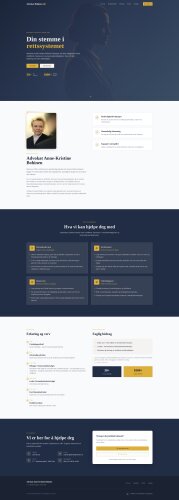Best Education Law Lawyers in Norway
Share your needs with us, get contacted by law firms.
Free. Takes 2 min.
Or refine your search by selecting a city:
List of the best lawyers in Norway
About Education Law in Norway
Education Law in Norway encompasses the statutes, regulations, and policies governing the education system. It covers everything from primary education to higher education institutions and ensures the right to education for all citizens. Major legal frameworks include the Education Act, the Free Education Act, and the Ownership Act, which provide the foundation for educational standards, rights, and obligations. The legislation is designed to ensure equal opportunities and non-discrimination in the educational sphere.
Why You May Need a Lawyer
There are various scenarios where you might require legal assistance in Education Law. Common situations include disputes over special education needs, issues relating to school discipline, challenges in admission processes, educational malpractice claims, and the need for accommodations for disabled students. Additionally, cases of discrimination or harassment within educational settings may require legal intervention. A lawyer specializing in Education Law can guide you through these complex issues and help enforce educational rights and compliance with legal standards.
Local Laws Overview
The Norwegian education system is governed by several key laws. The Education Act (Opplæringsloven) provides the main framework for educational policy and regulations. The Free Education Act (Gratisprinsippet) ensures the right to free education in public schools. Norway’s equal opportunities legislation, such as the Equality and Anti-Discrimination Act, plays a crucial role in ensuring discrimination-free education. Additionally, the Rights to Students in Higher Education Act outlines student rights and the responsibilities of higher education institutions. Understanding these core laws can help navigate the complex legal landscape of education in Norway.
Frequently Asked Questions
What rights do students have under the Norwegian Education Act?
Students are entitled to a safe learning environment, equal learning opportunities regardless of background, and access to quality education. The Education Act provides a framework for these rights, ensuring fairness and equality.
Who oversees the implementation of education laws in Norway?
The Directorate for Education and Training, along with the Ministry of Education and Research, are responsible for overseeing the implementation of education laws and ensuring compliance.
How does Norway ensure non-discriminatory practices in education?
The Equality and Anti-Discrimination Act prohibits discrimination based on gender, ethnicity, religion, disability, or sexual orientation, aiming to foster an inclusive educational environment.
What are the legal requirements for special education in Norway?
Norwegian law mandates that students with special educational needs are entitled to tailored educational plans and support to ensure they receive comparable levels of education to their peers.
Can private schools charge tuition fees in Norway?
Private schools are allowed to charge tuition fees, unlike public schools, where education is free. However, such fees must be reasonable and in accordance with regulations set by the free education principles.
How are disputes between parents and schools typically resolved?
Disputes may be addressed through negotiation, mediation, or legal proceedings if necessary, with the aim of achieving an amicable resolution that respects students' rights.
What constitutes educational malpractice in Norway?
Educational malpractice involves any failure by the educational institution to provide an acceptable standard of education or to act according to established educational norms and regulations.
How can foreign students safeguard their educational rights in Norway?
Foreign students have rights similar to local students, and they can approach educational ombudsmen or legal advisors if they face any issues concerning their educational rights.
What should a parent do if they suspect their child is a victim of bullying in school?
Parents should report the issue to school authorities immediately and, if necessary, escalate it to local educational authorities or seek legal counsel to ensure appropriate measures are taken.
Are there legal protections for teachers in Norway relating to employment and working conditions?
Teachers in Norway are protected under labor laws that cover employment rights, working conditions, and professional autonomy, ensuring fair treatment within their roles.
Additional Resources
For more information on Education Law in Norway, you may consult the following resources:
- The Directorate for Education and Training
- The Norwegian Ministry of Education and Research
- The Equality and Anti-Discrimination Ombud
- The Norwegian Association of Lawyers
- Local educational authorities in your municipality
Next Steps
If you need legal assistance in Education Law, consider the following steps:
- Identify the specific issue or legal challenge you are facing within the educational framework.
- Consult with a lawyer specializing in Education Law for professional advice and to explore your options.
- Contact local educational authorities or ombudsmen if the issue can be resolved through administrative channels.
- Gather any relevant documents and evidence to support your case.
- Consider mediation or other alternative dispute resolution methods, if applicable, to avoid lengthy legal battles.
Ensuring you proceed with an informed approach can significantly enhance your chances of a favorable outcome.
Lawzana helps you find the best lawyers and law firms in Norway through a curated and pre-screened list of qualified legal professionals. Our platform offers rankings and detailed profiles of attorneys and law firms, allowing you to compare based on practice areas, including Education Law, experience, and client feedback.
Each profile includes a description of the firm's areas of practice, client reviews, team members and partners, year of establishment, spoken languages, office locations, contact information, social media presence, and any published articles or resources. Most firms on our platform speak English and are experienced in both local and international legal matters.
Get a quote from top-rated law firms in Norway — quickly, securely, and without unnecessary hassle.
Disclaimer:
The information provided on this page is for general informational purposes only and does not constitute legal advice. While we strive to ensure the accuracy and relevance of the content, legal information may change over time, and interpretations of the law can vary. You should always consult with a qualified legal professional for advice specific to your situation.
We disclaim all liability for actions taken or not taken based on the content of this page. If you believe any information is incorrect or outdated, please contact us, and we will review and update it where appropriate.
Browse education law law firms by city in Norway
Refine your search by selecting a city.














